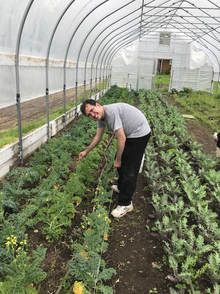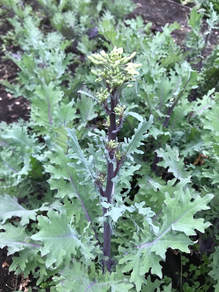Darren: What’s growing at the farm right now?
Matt: Regular kale and red Russian kale.
Chris: We also have some spinach growing there as well, growing alongside the kale.

M: They’re doing pretty good.
C: Yeah, they look like they’re coming along really nicely. Some of the kale is getting really big right now. And they taste great because these plants took in a lot of extra sugars having been tended during the colder winter months.
D: Great, can you describe it, the look of the greenhouse?
C: I’d say the kale is enormous, like a couple feet high, don’t you think?
Matt: Definitely. The thing I’m focusing on right now is getting our system in balance, and handling some algae issues with our gutters. The plants look terrific.
Darren: What are you guys doing these days for your work? What sort of jobs do you do, you know, like, when you’re at Green Bridge? What needs to be done?
M: Well, for me, for example, I’m handling the bolting of our plants - that means trimming certain flowers on kale.
C: Yeah, to trim the flowers on the kale so that the energy doesn’t all go into the flowers, so that it can go into the leaves. And we are really working to get a handle on maintaining our system and cleaning out any algae the system might produce.
D: Okay, tell me why that’s important. Why do you guys clean out algae?
C: I guess it’s to make sure the fish get enough oxygen. Algae takes oxygen away from the fish and out of the system. The cleaner our vertical growing tower gutters are, the better things are all around when you grow aquaponically.
M: The gutters are important! We have to make sure the water as we have it plumbed will run smoothly through the system, and each cluster of towers has their own gutters. So overall cleanliness and sanitation is very important in farming and in aquaponics. Our equipment will last longer the more we keep it clean, too.
D: What do you each like to contribute or add to the farm with your special skills and talents
M: Well, for me it would be business, like thinking of ideas, marketing, what can we do to improve the products, and asking for other businesses to use our products. Sharing our story and social mission, for sure.
C: I studied organic farming so I know a good amount about farming and organic farming and how to grow the crops. And Matt also says I’m really good at--being really precise at planting seeds.
M: That’s true.
D: Is there anything else that you do outside of the marketing aspects and recruiting? As far as your customers?
Matt: Well, all I do is just basically give them--just tell them about awareness about--not just for the business but also about the autism part too and how we are using our talents to grow good food. Like for example, Down to Earth, we developed a business relationship with them. They’re an organic store. And we’re still working with them.
D: So what are some of the things you’ll tell people when you’re out and you’re trying to tell the story Green Bridge? What are some of the things that you would say?
C: First off, that we’re a sustainable farm and that we do a unique method called aquaponics.
M: We believe in growing organic and do not use pesticides. So most importantly, we can offer people fresh and healthy plants without using pesticides in our system. Our food is tasty, and it is grown with the talents of people with autism.
D: What are your hopes for Green Bridge Growers?
M: To expand - maybe to other locations and cities, possibly down the road. Get multiple restaurants to use our stuff. And looking forward to big things with money.
C: Yeah, I really like organic farming and I like being able to use my talents to grow crops, and yeah, I’m also looking forward to bigger things with money as well.
D: What would you like others to know about why it’s a smart idea to hire people with autism?
M: That we have different intelligences, and strengths. Chris is “book smart”, and I am “street smart.”
D: So what do you mean by that?
M: Well, book smart is to have a knowledge of organic farming. Chris knows what to do, and how to keep the product going. Street smart for me is telling people--telling businesses about our ideas and trying to spread it to restaurants, stores...you know, using economic knowledge, using money.
D: What do you think about that, Chris? He always says you’re more book smart--
Chris: Oh yeah, I guess that’s kind of true. I was always fortunate to be one of the top people in my classes in school. I like learning.

Matt: Oh I know what it is.
Darren: All right, so give me a sales pitch about Green Bridge Growers. I want to buy some stuff.
Matt: Well, for beginners, Green Bridge, we care about using non-pesticide for our business, and it’s local, and we have a greenhouse, we have an aquaponics system, and we can use those plants, not just for business, but also--you can also understand the plants themselves. And we can also use--not just for restaurants, but we also make for ourselves too, like you can make tea, kale chips, etc. And basically what we grow is local, not from another state. What we grow are home-grown plants from this area.
Chris: Yeah, and in addition to it being local and not being shipped in from another part of the country like much conventional farming is -- what makes Green Bridge unique is first of all, the fact that we use aquaponics, which is really sustainable and that uses 90% less water, but also that we employ people on the autism spectrum. We are entrepreneurs.
Darren: What do you like about working with people on the autism spectrum?
C: First of all, I myself am on the autism spectrum, so I like associating with people that are similar to me, so there’s that. What about you, Matt?
M: Basically the same thing. The only difference is that his specialties lie on science, and my specialty relies on business. People with autism have a lot of skills, and putting those skills to work.
D: So do you think there’s more opportunity out there for other people on the autism spectrum to work with you all?
M: Yes.
C: Yes, I think so. We’ve gotten a few of my friends on the autism spectrum saying they would want to join Green Bridge, so yeah, I think so.
D: Do you think they can contribute different ideas or things to the company?
M: Yes--
C: I think so.
M: --They can.
D: How so?
M: Well, there’s going to be some ideas that we already said, they may have something to offer that’s unique. Because sometimes when you’ve got multiple minds, it could lead to greatness, and I believe that we always want to hear everybody’s perspective to build a team.
 RSS Feed
RSS Feed
